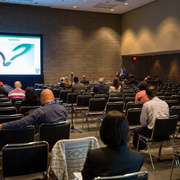
Choose a channel
Check out the different Progress in Mind content channels.

Progress in Mind






Mood disorders are a leading cause of disability, yet many are highly treatable. To choose the best possible management plan for patients and to plan service provision effectively, it is important to know which patients are at risk of hospitalization and understand the factors that may affect length of stay (LOS) and readmission.
Speaking at an APA session in May 2016, Dr John Goethe of Hartford Hospital in Connecticut, reported the findings of a study of over 12,500 hospitalized patients with mood disorders discharged between 2000 and 2013, which looked at predictors of prolonged LOS and later readmissions. Two thirds of the sample had MDD and readmission was assessed at various time-points after the index admission – 1, 3, 6 and 12 months post-discharge.
A number of potential predictors of long LOS (greater than 9 days) and readmission were examined: presence of psychotic features; being on more than 2 psychotropic drugs; and co-occurrence of other psychiatric conditions, namely bipolar disorder, substance use disorder (drugs and alcohol) and PTSD.
Dr Goethe reported that at the 12-month time-point, 22% of patients with MDD and 24% with bipolar had been readmitted. In terms of LOS for these mood disorders, stays were longer for bipolar disorder than for MDD. He said that having psychotic features with MDD increased the 30-day readmission rate to 11% compared with 7% in patients without psychotic features. Similarly, patients receiving more than 2 drugs for their condition, or having co-occurrent PTSD were more likely to be readmitted at any time during follow-up. In MDD, alcohol use appear to have a protective effect at the 1 month time-point in MDD, reducing readmission rates, but this effect was lost with continued follow-up.
In terms of LOS, psychotic features with MDD and multiple therapies increased LOS, while co-occurrent PTSD reduced LOS.
In the same APA session, delegates heard the findings of two meta-analyses that assessed the types of patients with mood disorders included in randomized, placebo controlled trials (RCTs) in the past 20 years. Professor Mark Zimmerman, Professor of Psychiatry at Brown Medical School, Rhode Island said that a review of antidepressant trials in patients with MDD, which included 170 different studies published in the past 15 years, shows that most of the MDD patients seen in routine practice would be very unlikely to meet the entry criteria. For example, patients with MDD were typically excluded from RCTs for having depression diagnosed for more than 2 years, multiple episodes, for having co-occurrent axis I diagnoses and for suicidality.
According to Professor Zimmerman, this means that at least 40% of the MDD patients seen in routine practice would not be eligible to take part in an RCT of an antidepressant therapy.
The same exercise looking at RCTs in bipolar disorder, also highlighted that patient cohorts are restricted and unrepresentative of real-world patient populations.
Professor Zimmerman conceded that the nature of regulatory studies requires assessment in homogeneous patient populations but he lamented that there is consequently a dearth of real-world data on the effectiveness of treatments in the highly heterogeneous and complex patients actually encountered in everyday practice.
Sign-up for our newsletter and get our APA highlights report.
A highly heterogeneous group of patients come under the umbrella of mood disorders.